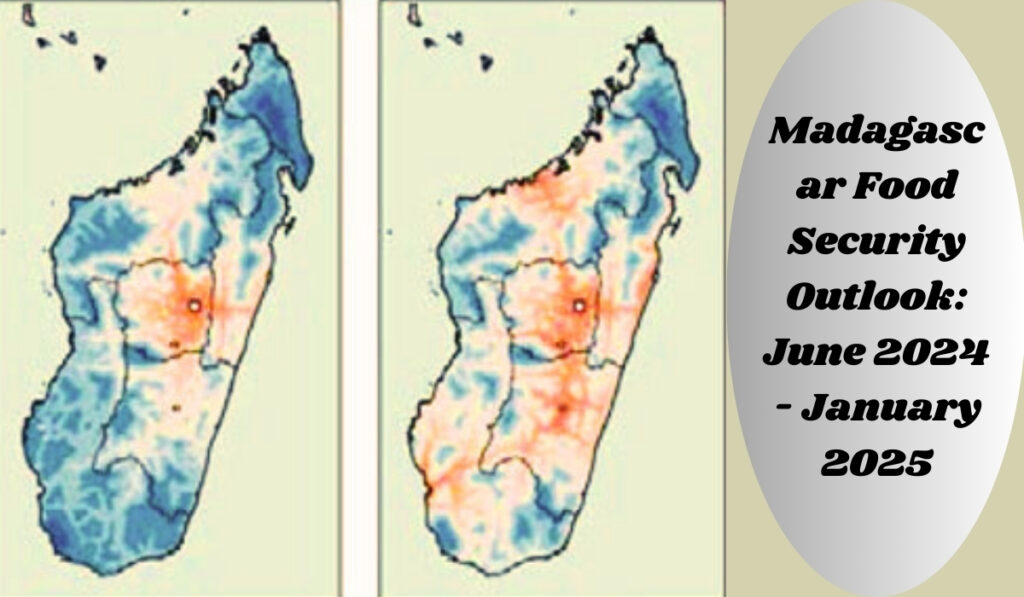Overview
This report provides a comprehensive analysis of the food security situation in Madagascar’s Grand South and Grand Southeast regions, covering the period from June 2024 to January 2025.
It examines how various factors have influenced food security in these vulnerable areas, focusing on the impact of weather shocks, humanitarian aid, and economic conditions.
Specifically, the report delves into the effects of extreme weather events, such as droughts and cyclones, which have disrupted agricultural production and exacerbated food shortages. Additionally, it evaluates the role of humanitarian aid programs in alleviating food insecurity and their effectiveness in addressing immediate needs.
Economic factors, including market fluctuations and local income levels, are also analyzed to understand their contribution to food security challenges. By integrating these elements, the report aims to provide a detailed overview of the current food security landscape and offer insights into the ongoing efforts to improve conditions in these critically affected regions.
Current Situation: June to September 2024
Food Security Status
- Regions Affected: Grand South, Grand Southeast, and parts of northern and eastern Madagascar.
- Expected Outcomes: Stressed (IPC Phase 2) food security outcomes due to:
- Seasonal low food needs.
- Below-average food and cash crop production due to:
- Erratic rainfall in the south.
- Cyclones in the north and east.
- Higher instances of pests.
Harvests
- Forecast: Better than previous drought years, leading to improved food security during the post-harvest period.
Projected Situation: October 2024 to January 2025
Food Security Status
- Expected Outcomes:
- Stressed! (IPC Phase 2!) with some areas likely to experience Crisis (IPC Phase 3) outcomes as food stocks deplete.
- Increased reliance on markets for food amid higher prices and below-average incomes.
Humanitarian Assistance
- Targeted Assistance: 280,000 households in the Grand South and Grand Southeast will receive half rations during the lean season.
- Areas of Concern:
- High Concern: Bekily, Beloha, and Tsihombe where assistance levels may not prevent worse outcomes.
- Other Concerned Areas: Ampanihy, Amboasary, and Ambovombe may have populations in Crisis (IPC Phase 3) despite mitigating efforts.
Factors Impacting Food Security
Weather Shocks
- Erratic Rainfall: Affects crop production in the south.
- Cyclones: Impact crop production in the north and east.
- Pest Infestation: Further reduces crop yields.
Economic Factors
- Market Reliance: Households will need to buy food at higher prices due to depleted stocks.
- Income Constraints: Limited job opportunities and reduced capacity to purchase agricultural inputs affect middle and better-off households, impacting poorer households who rely on these for income.
Humanitarian Assistance
- Role of Aid: Crucial in closing food consumption gaps and protecting livelihoods in most areas of concern.
Future Outlook: Agricultural Season
Rainfall Forecast
- Average Start: Expected to support recovery in crop and livestock production.
- Constraints: Limited cropped area due to reduced capacity of middle and better-off households to invest in agricultural inputs and labor.
Conclusion
The food security outlook for Madagascar’s Grand South and Grand Southeast regions indicates a period of stress with some areas likely to experience crisis conditions. Humanitarian aid is crucial to mitigate food consumption gaps and support livelihoods, particularly during the lean season. Future agricultural recovery depends on favorable weather conditions and the ability of households to invest in crop production.
During the lean season, when resources are particularly scarce, targeted assistance can help bridge food consumption gaps and prevent malnutrition. This aid is essential not only for immediate relief but also for supporting longer-term recovery and resilience-building efforts.
Looking forward, the prospects for agricultural recovery in these regions are closely tied to the weather conditions over the coming months. Favorable rainfall and temperature patterns are crucial for successful crop production and for replenishing depleted food stocks.
Moreover, the ability of local households to invest in and manage crop production will be a key factor in determining the future stability of food security. Access to resources, knowledge, and financial support for agricultural activities will significantly influence whether these communities can recover and achieve greater food self-sufficiency in the future.
Sources:
- IPC (Integrated Food Security Phase Classification)
- Humanitarian Assistance Reports
This simplified and detailed overview highlights the key factors affecting food security in Madagascar and the projected outcomes for the upcoming months.

